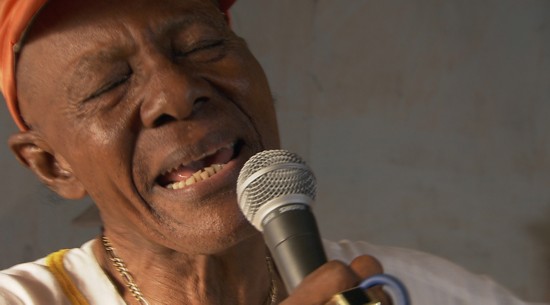FILM-FORWARD.COMReviews of Recent Independent, Foreign, & Documentary Films in Theaters and DVD/Home Video
Directed by Jacques Sarasin Produced by Les Productions Faire Bleu Director of Photography, Remon Fromont Edited by Bernard Josse Released by First Run Features Lingala with English subtitles France. 82 min. Not Rated The Democratic Republic of Congo (formerly known as the Belgian Congo and then Zaire) usually only makes the international news with the excesses of dictators and the seemingly endless internecine violence. Director Jacques Sarasin, at first, seems intent on mostly capturing the disastrous social and economic impact when he filmed along the languid Congo River and in the crowded capital of Kinshasa in late 2004 – with a visual emphasis on the abandoned boats, squalid living conditions, and burgeoning population of hungry, restless youth. But in the midst of misery, he finds the joy created by musical virtuosos. Slowly, his camera goes from this depressing panorama to a household with a sleepy old man nagged by his busy wife. She complains of needing money for food, while her husband protests there’s no work. But these domestic travails are interspersed with a few old photographs and comments by colleagues, only identified later, who describe the career of the patriarch, Antoine “Wendo” Kolosoy, who stormed the country in 1948 with the huge hit “Marie Louise” that made him a superstar. Singing joyous love songs in Lingala on a beat-up guitar, he raised the suspicions of the colonial police, who thought his singing, in a native tongue they didn’t understand, could be seditious. Priests denounced it as devil music. After the initial heady days of independence in 1965, his popular songs that combined traditional Congolese rhythms with Caribbean influences to make a new sound called “rumba” were eventually deemed not authentically African by President Mobutu. To support his family, Wendo turned his competitive feistiness into a career in boxing, and then whatever else he could do. But for this film and a new recording session, Wendo, now 83, sends out the word that he is re-forming his old band. With each impeccably dressed in old suits and fedoras, the elderly men gradually pick up where they left off years ago. (The group does not include the rumba performer Papa Wemba, who is more known in the wider world music community, having adapted more to changing tastes, including collaborating with Peter Gabriel.) The musicians (and the cameras) attract gawking youngsters, but, more poignantly, older people nostalgic for their youth who exuberantly dance to a musical style they haven’t heard in years. This celebration of popular music now ignored by contemporary tastes recalls the rediscovery of pre-revolutionary Cuban musicians in Wim Wenders’ Buena Vista Social Club. The rambling On the Rumba River is most coherent, and most similar to Sarasin’s earlier film I’ll Sing for You about African musical elder Boubacar “KarKar” Traoré of Mali, when each musician is interviewed after Wendo tracks him down in slums and shanty towns. All are delighted to talk about how they fell in love with their instrument and were drawn from all over Africa to join Wendo’s band. Then more sadly, they reluctantly recount how they have barely managed to support their very, very large families since.
One by one, more musicians return and Wendo beautifully adds layers of instruments – saxophone, trumpet, guitar, drums – and vocals as they
get their groove back. (Antoine Moundanda, in particular, is a superb master of the thumb piano.) In these highlights, the film gloriously celebrates
the triumph of talent and art even in the most deprived circumstances. But Sarasin does not conclude on this moving uplift. Instead, he then
accompanies Wendo on a mournful trip down the Congo River where the musician expresses regrets for the miserable condition of his country,
followed by horrific
statistics on the continuing violence.
Nora Lee Mandel
|
